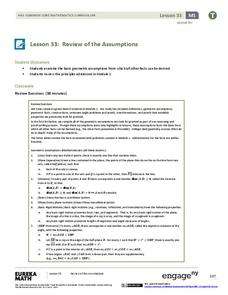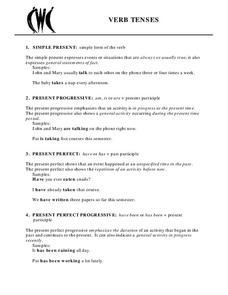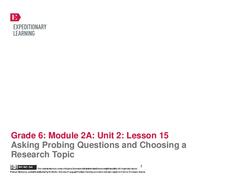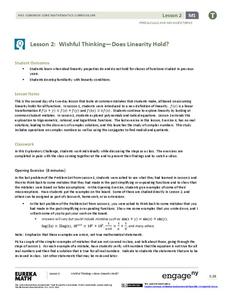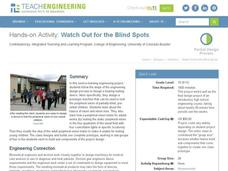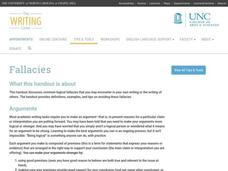EngageNY
Summarizing Notes: Planning a Graphic Novelette, Part II: The Invention of Television
Let's work together! Using the collaborative resource, scholars work in triads to begin section two of their storyboards about Philo Farnsworth, the inventor of the television. They then practice using linking words and phrases to...
Curated OER
The Gender of Nouns
A great handout for middle-schoolers learning nouns and their genders, this resource is comprehensive and easy to read. Consider providing some practice opportunities for your learners while you review the information.
Judicial Learning Center
Article III and the Courts
What's the best way to make sense of the Constitution? A helpful lesson contains both the text of Article III and annotation of each of its sections, breaking it down into easy-to-understand parts. It also includes links to a...
Scholastic
Study Jams! The Immune System
A set of slides depicts sick children, an artistic rendition of a white blood cell amongst red blood cells, and a diagram of part of the lymph system to teach youngsters about immunity. Kids will find that it is made up of skin, white...
Scholastic
Study Jams! Classify Quadrilaterals
Face the vertex of two-dimensional shapes and discover what each figure requires as part of its classification. With one shape per slide, learners see what makes each shape special and compare it to others with similar qualities.
EngageNY
Review of the Assumptions (part 1)
What was the property again? Tired of hearing this from your pupils? Use this table to organize properties studied and as a reference tool for individuals. Learners apply each property in the third column of the table to ensure their...
American Institute of Physics
Historical Detective: Edward Alexander Bouchet and the Washington-Du Bois Debate over African-American Education
Young scientists meet Edward Alexander Bouchet who, in 1876, was the first African American to receive a PhD in Physics. This two-part lesson first looks at the debate between Booker T. Washington and W.E.B. Du Bois about the type of...
Teach Engineering
Energy Forms, States and Conversions
Even magicians can't make energy disappear. In a discussion-based lesson, young scientists learn about energy forms and conversions. They see how energy is neither created nor destroyed; it just changes forms. This is the 11th...
Scholastic
Study Jams! Atoms: Protons, Neutrons, Electrons
What's smaller than a kiwi seed? Atoms! Basic atomic structure is detailed for beginning chemists in a light-hearted animation. Protons and neutrons are explained as part of the nucleus, and so are electrons that encircle the nucleus....
Scholastic
Study Jams! Prime Factorization
Deepen the number sense of young mathematicians by exploring the process of prime factorization. Follow along with this step-by-step presentation that explains how factor trees are used to break a composite number down into its prime...
Curated OER
Lesson 5: In the Courtroom: Understanding the Players and the Action
Young lawyers put Goldilocks on trial as they develop an understanding of the legal system in the final lesson of this five-part series. After learning about key terms relating to litigation, students are assigned roles and reading...
St. Louis Community College
Verb Tenses
Help your pupils keep their simple, perfect, and progressive tenses straight with a reference page. Each verb tense is paired with a definition and at least one sample sentence.
EngageNY
Asking Probing Questions and Choosing a Research Topic
Begin the writing journey of an evidence-based essay detailing a rule to live by with various activities to familiarize learners with the topic and jump-start brainstorming. First, pupils take part in an in-depth review and discussion of...
E Reading Worksheets
Tone: Voice of the Speaker
Tone and mood are easy to use interchangeably—and yet they are very different elements of literature. Help middle schoolers discern between the way a speaker feels about his or her subject and the way the audience is meant to feel with a...
Teach Engineering
Skin and the Effects of Ultraviolet Radiation
Though UV radiation can damage skin, it isn't all bad. The third installment in a six-part series allows the class to study the structure and function of skin. They learn about the different types of skin cancer and the SPF rating...
EngageNY
Wishful Thinking—Does Linearity Hold? (Part 2)
Trying to find a linear transformation is like finding a needle in a haystack. The second lesson in the series of 32 continues to explore the concept of linearity started in the first lesson. The class explores trigonometric, rational,...
EngageNY
Writing Equations Using Symbols
Build upon prior equation writing experience to create more complicated equations. Lesson one in a 33-part unit builds upon the class members' sixth and seventh grade experience of writing linear equations. Several examples...
Teach Engineering
Watch Out for the Blind Spots
Applying engineering concepts to the field of medicine, pupils design a device to help test peripheral sight. The class learns and follows a specific design process for engineers before separating into groups; each group builds...
Teach Engineering
Alloy Advantage
Mix it up by using an intriguing resource that teaches young metallurgists that alloys are a metal mixture. They learn about the advantages of using alloys over pure metals and investigate titanium alloys as an example to finish the...
Teach Engineering
Concentrate This! Sugar or Salt...
Heat up your lessons on boiling points. The resource provides a three-part activity: first, groups find the boiling point of solutions; second, they create boiling point curves for salt and sugar solutions; and third, they mix a solution...
Texas Education Agency (TEA)
Geometry in Architecture #1
Discover how to analyze architecture from a geometric standpoint. The fourth installment of an 11-part unit on architecture first provides a presentation on axis, balance, basic form, formal, pattern, proportion, symmetry, and tripartite...
Concord Consortium
Van de Graaff Discharge
Your class will definitely get a charge out of an electric interactive! Show young scientists what really happens when you place a wand near a Van de Graaff generator using a simulation. Pupils add varying amounts of negative charge to...
Newspaper Association of America
The News
Young journalists learn about topics such as newspaper ethics, parts of a newspaper, credible sources, and different types of articles. The lesson empowers individuals and gives them the capability to express their voices through the...
University of North Carolina
Fallacies
All teacher workrooms contain a coffee maker, therefore all teachers must be addicted to coffee. That sentence represents a logical fallacy (although it may be true from some), a topic the seventh installment in the 24-part Writing the...




